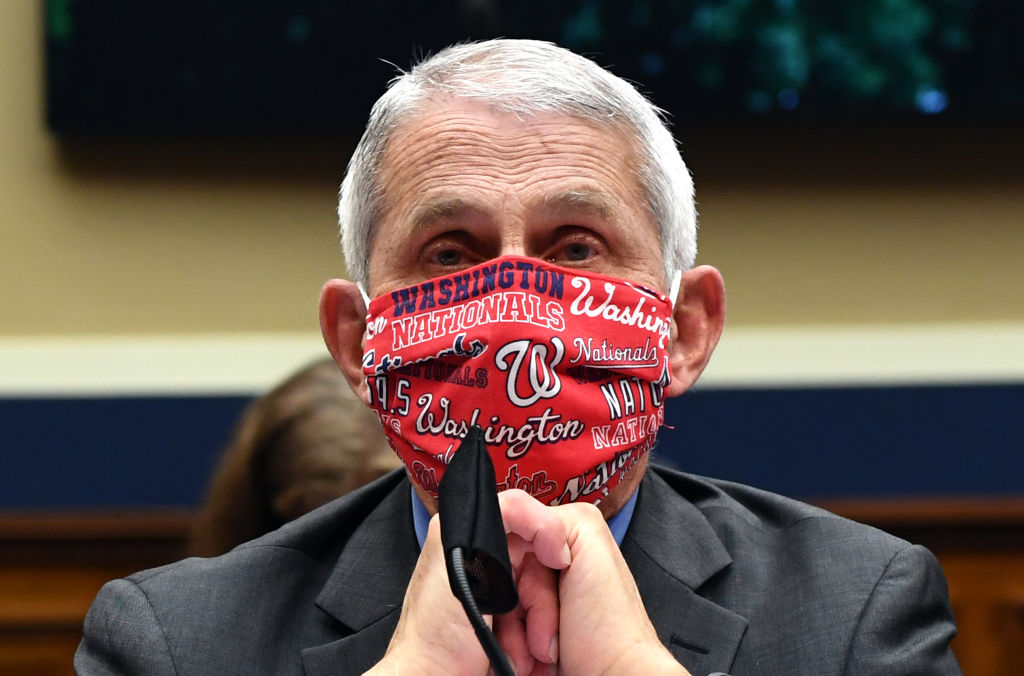The White House is sending journalists 'opposition research' on Dr. Anthony Fauci, limiting his TV appearances


A free daily email with the biggest news stories of the day – and the best features from TheWeek.com
You are now subscribed
Your newsletter sign-up was successful
The White House has sent reporters at several mainstream media organizations a lengthy list of comments Dr. Anthony Fauci made early on in the COVID-19 pandemic, in an apparent push to undermine the nation's top federal infectious disease expert after he publicly disagreed with President Trump's optimistic assessment of the growing outbreak in the U.S. An unidentified White House official told The Washington Post, CNN, and other news organizations over the weekend that "several White House officials are concerned about the number of times Dr. Fauci has been wrong on things."
The list includes comments Fauci made as early as January that, while reflecting the scientific thinking on the new coronavirus at the time, are now believed to be incorrect. In some cases, they truncated his comments to leave off warnings about the disease. The White House is essentially treating Fauci "as if he were a warring political rival," The New York Times reports, and the list of his comments is "laid out in the style of a campaign's opposition research document." The bullet points "resembled opposition research on a political opponent," CNN concurs. The list was also sent to NBC News.

Fauci and Trump have never seen eye-to-eye on the disease, and their early apparent rapport has publicly frayed; the Times says the split widened when Fauci dismissed the efficacy of Trump's favored treatment, hydroxychloroquine, while the Post adds in policy disagreements over face masks and reopening businesses and schools. "Trump is also galled by Fauci's approval ratings," the Post reports, noting a recent Times/Siena College poll showing 67 percent of voters trusting Fauci on the pandemic versus 26 percent who trusted Trump.
The Week
Escape your echo chamber. Get the facts behind the news, plus analysis from multiple perspectives.

Sign up for The Week's Free Newsletters
From our morning news briefing to a weekly Good News Newsletter, get the best of The Week delivered directly to your inbox.
From our morning news briefing to a weekly Good News Newsletter, get the best of The Week delivered directly to your inbox.
A senior administration official told CNN some White House officials don't trust Fauci because they don't think he has Trump's best interests in mind, pointing to statements were he publicly disagreed with Trump.
After CBS's Margaret Brennan noted last Sunday that Face the Nation had tried unsuccessfully to book Fauci for three months, White House communications officials — who, along with Michael Caputo, a Trump ally and Roger Stone friend who runs communications at the Department of Health and Human Services, have to approve all coronavirus-related TV appearances — agreed to book Fauci on PBS NewsHour, CNN, and NBC's Meet the Press, the Post reports. After Fauci disputed Trump's "false narrative" about falling mortality rates on Facebook Live, those appearances were all canceled.
A free daily email with the biggest news stories of the day – and the best features from TheWeek.com
Peter has worked as a news and culture writer and editor at The Week since the site's launch in 2008. He covers politics, world affairs, religion and cultural currents. His journalism career began as a copy editor at a financial newswire and has included editorial positions at The New York Times Magazine, Facts on File, and Oregon State University.
-
 Why is the Trump administration talking about ‘Western civilization’?
Why is the Trump administration talking about ‘Western civilization’?Talking Points Rubio says Europe, US bonded by religion and ancestry
-
 Quentin Deranque: a student’s death energizes the French far right
Quentin Deranque: a student’s death energizes the French far rightIN THE SPOTLIGHT Reactions to the violent killing of an ultraconservative activist offer a glimpse at the culture wars roiling France ahead of next year’s elections
-
 Secured vs. unsecured loans: how do they differ and which is better?
Secured vs. unsecured loans: how do they differ and which is better?the explainer They are distinguished by the level of risk and the inclusion of collateral
-
 ‘One Battle After Another’ wins Critics Choice honors
‘One Battle After Another’ wins Critics Choice honorsSpeed Read Paul Thomas Anderson’s latest film, which stars Leonardo DiCaprio, won best picture at the 31st Critics Choice Awards
-
 Son arrested over killing of Rob and Michele Reiner
Son arrested over killing of Rob and Michele ReinerSpeed Read Nick, the 32-year-old son of Hollywood director Rob Reiner, has been booked for the murder of his parents
-
 Rob Reiner, wife dead in ‘apparent homicide’
Rob Reiner, wife dead in ‘apparent homicide’speed read The Reiners, found in their Los Angeles home, ‘had injuries consistent with being stabbed’
-
 Hungary’s Krasznahorkai wins Nobel for literature
Hungary’s Krasznahorkai wins Nobel for literatureSpeed Read László Krasznahorkai is the author of acclaimed novels like ‘The Melancholy of Resistance’ and ‘Satantango’
-
 Primatologist Jane Goodall dies at 91
Primatologist Jane Goodall dies at 91Speed Read She rose to fame following her groundbreaking field research with chimpanzees
-
 Florida erases rainbow crosswalk at Pulse nightclub
Florida erases rainbow crosswalk at Pulse nightclubSpeed Read The colorful crosswalk was outside the former LGBTQ nightclub where 49 people were killed in a 2016 shooting
-
 Trump says Smithsonian too focused on slavery's ills
Trump says Smithsonian too focused on slavery's illsSpeed Read The president would prefer the museum to highlight 'success,' 'brightness' and 'the future'
-
 Trump to host Kennedy Honors for Kiss, Stallone
Trump to host Kennedy Honors for Kiss, StalloneSpeed Read Actor Sylvester Stallone and the glam-rock band Kiss were among those named as this year's inductees
